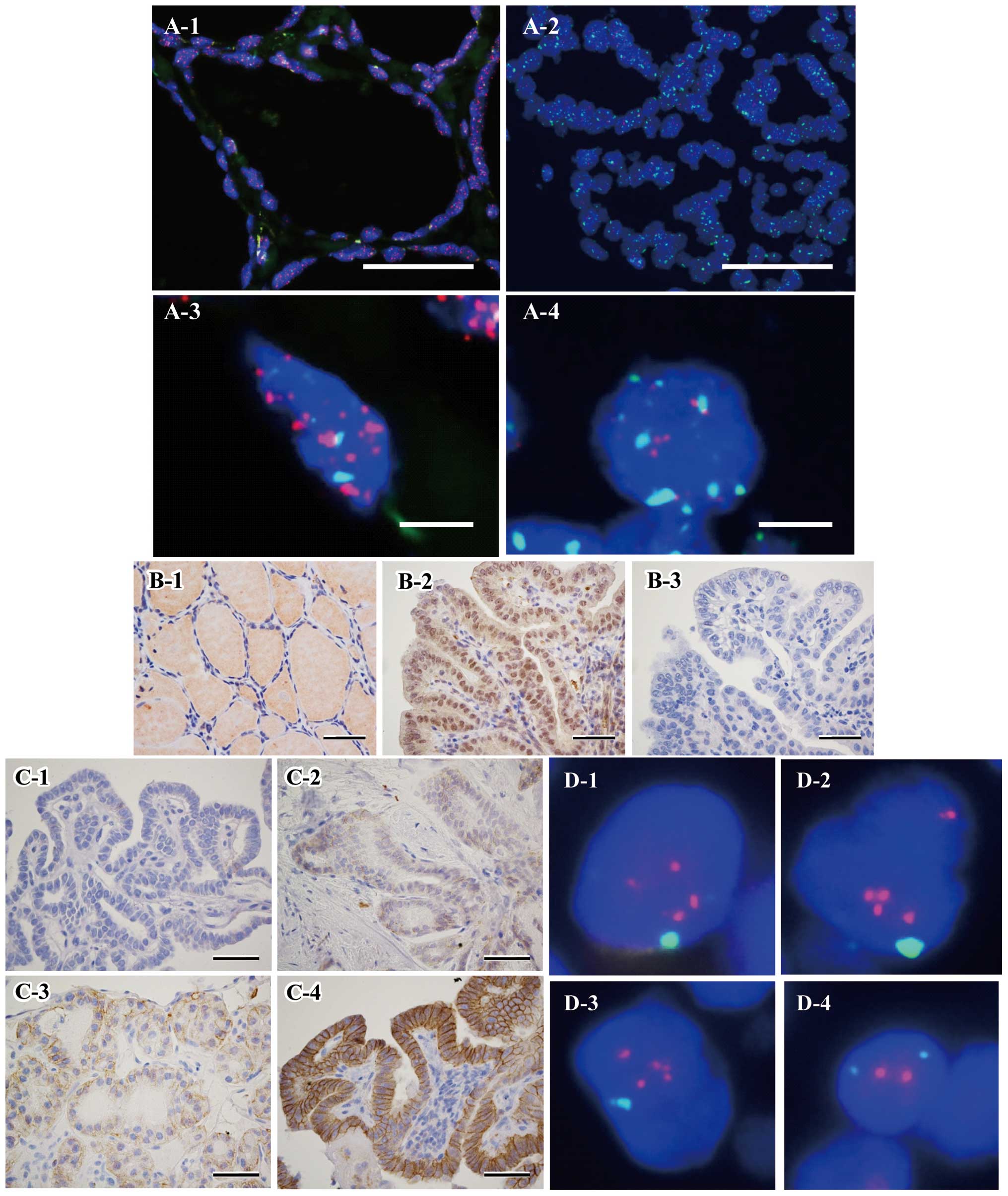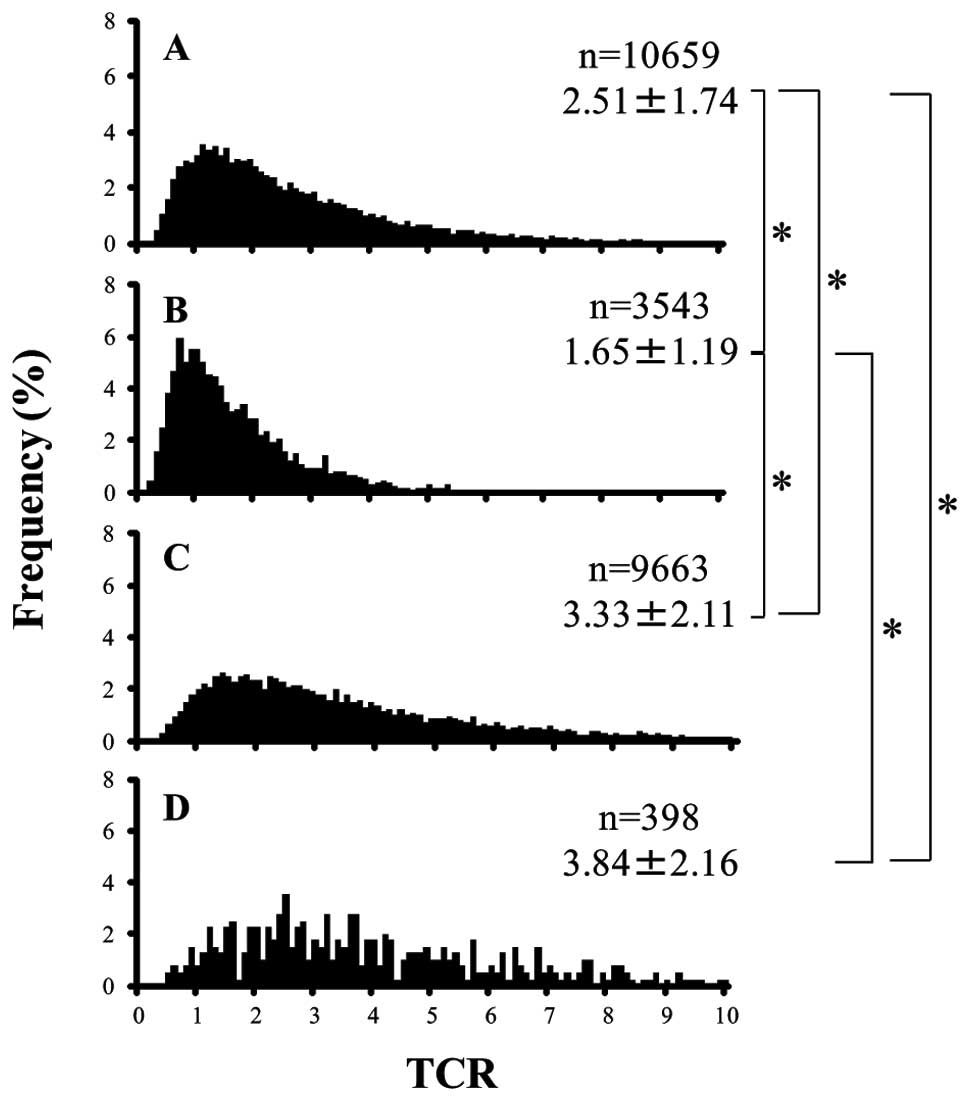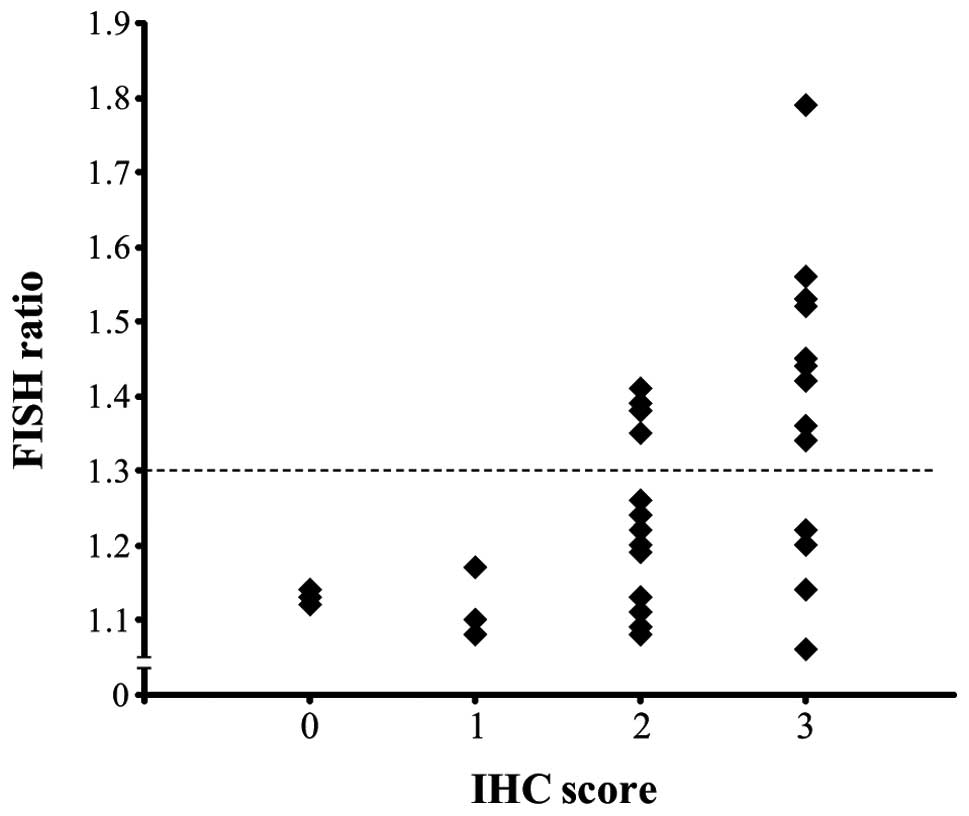|
1.
|
Hynes NE and Stern DF: The biology of
erbB-2/neu/HER-2 and its role in cancer. Biochim Biophys Acta.
1198:165–184. 1994.PubMed/NCBI
|
|
2.
|
Akiyama T, Sudo C, Ogawara H, Toyoshima K
and Yamamoto T: The product of the human c-erbB-2 gene: a
185-kilodalton glycoprotein with tyrosine kinase activity. Science.
232:1644–1646. 1986. View Article : Google Scholar : PubMed/NCBI
|
|
3.
|
Salmon DJ, Clark GM, Wong SG, Levin WJ,
Ullrich A and McGuire WL: Human breast cancer: correlation of
relapse and survival with amplification of the HER-2/neu oncogene.
Science. 235:177–182. 1987. View Article : Google Scholar : PubMed/NCBI
|
|
4.
|
Salmon DJ, Godolphin W, Jones LA, Holt JA,
Wong SG, Keith DE, Levin WJ, Stuart SG, Udove J, Ullrich A and
Press MF: Studies of the HER-2/neu proto-oncogene in human breast
and ovarian cancer. Science. 244:707–712. 1989. View Article : Google Scholar : PubMed/NCBI
|
|
5.
|
Ross JS and Fletcher JA: The HER-2/neu
oncogene in breast cancer: prognostic factor, predictive factor,
and target for therapy. Oncologist. 3:237–252. 1998.
|
|
6.
|
Hofmann M, Stoss O, Shi D, Büttner R, van
de Vijver M, Kim W, Ochiai A, Rüschoff J and Henkel T: Assessment
of a HER2 scoring system for gastric cancer: results from a
validation study. Histopathology. 52:797–805. 2008. View Article : Google Scholar : PubMed/NCBI
|
|
7.
|
Park DI, Yun JW, Park JH, Oh SJ, Kim HJ,
Cho YK, Shon CI, Jeon WK, Kim BI, Yoo CH, Son BH, Cho EY, Chae SW,
Kim EJ, Shon JH, Ryu SH and Sepulveda AR: HER-2/neu amplification
is an independent prognostic factor in gastric cancer. Dig Dis Sci.
51:1371–1379. 2006. View Article : Google Scholar : PubMed/NCBI
|
|
8.
|
Yano T, Doi T, Ohtsu A, Boku N, Hashizume
K, Nakanishi M and Ochiai A: Comparison of HER2 gene amplification
assessed by fluorescence in situ hybridization and HER2
protein expression assessed by immunohistochemistry in gastric
cancer. Oncol Rep. 15:65–71. 2006.PubMed/NCBI
|
|
9.
|
Zhag XL, Yang YS, Xu DP, Qu JH, Guo MZ,
Gong Y and Huang J: Comparative study on overexpression of her2/neu
and her3 in gastric cancer. World J Surg. 33:2112–2118. 2009.
View Article : Google Scholar : PubMed/NCBI
|
|
10.
|
Uchino S, Tsuda H, Maruyama K, Kinoshita
T, Sasako M, Saito T, Kobayashi M and Hirohashi S: Overexpression
of c-erbB-2 protein in gastric cancer. Its correlation with
long-term survival of patients. Cancer. 72:3179–3184. 1993.
View Article : Google Scholar : PubMed/NCBI
|
|
11.
|
Nakajima M, Sawada H, Yamada Y, Watanabe
A, Tatsumi M, Yamashita J, Matsuda M, Sakaguchi T, Hirano T and
Nakano H: The prognostic significance of amplification and
overexpression of c-met and c-erb B-2 in human gastric carcinomas.
Cancer. 85:1894–1902. 1999. View Article : Google Scholar : PubMed/NCBI
|
|
12.
|
Allgayer H, Babic R, Gruetzner KU,
Tarabichi A, Schildberg FW and Heiss MM: c-erbB-2 is of independent
prognostic relevance in gastric cancer and is associated with the
expression of tumor-associated protease systems. J Clin Oncol.
18:2201–2209. 2000.PubMed/NCBI
|
|
13.
|
Garcia I, Vizoso F, Martin A, Sanz L,
Abdel-Lah O, Raigoso P and García-Muñiz JL: Clinical significance
of the epidermal growth factor receptor and HER2 receptor in
resectable gastric cancer. Ann Surg Oncol. 10:234–241. 2003.
View Article : Google Scholar : PubMed/NCBI
|
|
14.
|
Tanner M, Hollmén M, Junttila TT, Kapanen
AI, Tommola S, Soni Y, Helin H, Salo J, Joensuu H, Sihvo E, Elenius
K and Isola J: Amplification of HER-2 in gastric carcinoma:
association with topoisomerase IIalpha gene amplification,
intestinal type, poor prognosis and sensitivity to trastuzumab. Ann
Oncol. 16:273–278. 2005. View Article : Google Scholar : PubMed/NCBI
|
|
15.
|
Bang YJ, Van Cutsem E, Feyereislova A,
Chung HC, Shen L, Sawaki A, Lordick F, Ohtsu A, Omuro Y, Satoh T,
Aprile G, Kulikov E, Hill J, Lehle M, Rüschoff J and Kang YK; ToGA
Trial Investigators: Trastuzumab in combination with chemotherapy
versus chemotherapy alone for treatment of HER2-positive advanced
gastric or gastro-oesophageal junction cancer (ToGA): a phase 3,
open-label, randomised controlled trial. Lancet. 376:687–697. 2010.
View Article : Google Scholar
|
|
16.
|
Blackburn EH: Structure and function of
telomeres. Nature. 350:569–573. 1991. View
Article : Google Scholar : PubMed/NCBI
|
|
17.
|
Harley CB, Futcher AB and Greider CW:
Telomeres shorten during ageing of human fibroblasts. Nature.
345:458–460. 1990. View
Article : Google Scholar : PubMed/NCBI
|
|
18.
|
Von Zglinicki T: Oxidative stress shortens
telomeres. Trends Biochem Sci. 27:339–344. 2002.PubMed/NCBI
|
|
19.
|
Harly CB and Villeponteau B: Telomeres and
telomerase in aging and cancer. Curr Opin Genet Dev. 5:249–255.
1995. View Article : Google Scholar : PubMed/NCBI
|
|
20.
|
De Lange T: Telomeres and senescence:
ending the debate. Science. 279:334–335. 1998.PubMed/NCBI
|
|
21.
|
DePinho RA: The age of cancer. Nature.
408:248–254. 2000. View
Article : Google Scholar
|
|
22.
|
Svenson U and Roos G: Telomere length as a
biological marker in malignancy. Biochim Biophys Acta.
1792:317–323. 2009. View Article : Google Scholar : PubMed/NCBI
|
|
23.
|
Wyatt HD, West SC and Beattie TL:
InTERTpreting telomerase structure and function. Nucleic Acids Res.
38:5609–5622. 2010. View Article : Google Scholar : PubMed/NCBI
|
|
24.
|
Kammori M, Nakamura K, Hashimoto M, Ogawa
T, Kaminishi M and Takubo K: Clinical application of human
telomerase reverse transcriptase gene expression in thyroid
follicular tumors by fine-needle aspirations using in situ
hybridization. Int J Oncol. 22:985–991. 2003.PubMed/NCBI
|
|
25.
|
Furugori E, Hirayama R, Nakamura K,
Kammori M, Esaki Y and Takubo K: Telomere shortening in gastric
carcinoma with aging despite telomerase activation. J Cancer Res
Clin Oncol. 126:481–485. 2000. View Article : Google Scholar : PubMed/NCBI
|
|
26.
|
Nakamura K, Furugori E, Esaki Y, Arai T,
Sawabe M, Okayasu I, Fujiwara M, Kammori M, Mafune K, Kato M,
Oshimura M, Sasajima K and Takubo K: Correlation of telomere
lengths in normal and cancers tissue in the large bowel. Cancer
Lett. 158:179–184. 2000. View Article : Google Scholar : PubMed/NCBI
|
|
27.
|
Kammori M, Takubo K, Nakamura K, Furugouri
E, Endo H, Kanauchi H, Mimura Y and Kaminishi M: Telomerase
activity and telomere length in benign and malignant human thyroid
tissues. Cancer Lett. 159:175–181. 2000. View Article : Google Scholar : PubMed/NCBI
|
|
28.
|
O’Sullivan JN, Bronner MP, Brentnall TA,
Finley JC, Shen WT, Emerson S, Emond MJ, Gollahon KA, Moskovitz AH,
Crispin DA, Potter JD and Rabinovitch PS: Chromosomal instability
in ulcerative colitis is related to telomere shortening. Nat Genet.
32:280–284. 2002.PubMed/NCBI
|
|
29.
|
Meeker AK, Gage WR, Hicks JL, Simon I,
Coffman JR, Platz EA, March GE and De Marzo AM: Telomere length
assessment in human archival tissues: combined telomere
fluorescence in situ hybridization and immunostaining. Am J Pathol.
160:1259–1268. 2002. View Article : Google Scholar
|
|
30.
|
Kammori M, Kanauchi H, Nakamura K,
Kawahara M, Weber TK, Mafune K, Kaminishi M and Takubo K:
Demonstration of human telomerase reverse transcriptase in human
colorectal carcinomas by in situ hybridization. Int J Oncol.
20:15–21. 2002.PubMed/NCBI
|
|
31.
|
Aida J, Izumiyama-Shimomura N, Nakamura K,
Ishii A, Ishikawa N, Honma N, Kurabayashi R, Kammori M, Poon SS,
Arai T and Takubo K: Telomere length variations in 6 mucosal cell
types of gastric tissue observed using a novel quantitative
fluorescence in situ hybridization method. Hum Pathol.
38:1192–1200. 2007. View Article : Google Scholar
|
|
32.
|
Kammori M, Izumiyama N, Nakamura K,
Kurabayashi R, Kashio M, Aida J, Poon SS and Kaminishi M: Telomere
metabolism and diagnostic demonstration of telomere measurement in
the human esophagus for distinguishing benign from malignant tissue
by tissue quantitative fluorescence in situ hybridization.
Oncology. 71:430–436. 2006. View Article : Google Scholar
|
|
33.
|
Kawauchi K, Ihjima K and Yamada O: IL-2
increases human telomerase reverse transcriptase activity
transcriptionally and posttranslationally through
phosphatidylinositol 3′-kinase/Akt, heat shock protein 90, and
mammalian target of rapamycin in transformed NK cells. J Immunol.
174:5261–5269. 2005.PubMed/NCBI
|
|
34.
|
Rüschoff J, Dietel M, Baretton G, Arbogast
S, Walch A, Monges G, Chenard MP, Penault-Llorca F, Nagelmeier I,
Schlake W, Höfler H and Kreipe HH: HER2 diagnostics in gastric
cancer-guideline validation and development of standardized
immunohistochemical testing. Vichows Arch. 457:299–307.
2010.PubMed/NCBI
|
|
35.
|
Wolff AC, Hammond ME, Schwartz JN, Hagerty
KL, Allred DC, Cote RJ, Dowsett M, Fitzgibbons PL, Hanna WM, Langer
A, McShane LM, Paik S, Pegram MD, Perez EA, Press MF, Rhodes A,
Sturgeon C, Taube SE, Tubbs R, Vance GH, van de Vijver M, Wheeler
TM and Hayes DF: American Society of Clinical Oncology/College of
American Pathologists guideline recommendations for human epidermal
growth factor receptor 2 testing in breast cancer. J Clin Oncol.
25:118–145. 2007. View Article : Google Scholar
|
|
36.
|
Ito Y, Fukushima M, Kihara M, Takamura Y,
Kobayashi K, Miya A and Miyauchi A: Investigation of the prognosis
of patients with papillary thyroid carcinoma by tumor size. Endocr
J. 59:457–464. 2012. View Article : Google Scholar : PubMed/NCBI
|
|
37.
|
Jonklaas J, Nogueras-Gonzalez G, Munsell
M, Litofsky D, Ain KB, Bigos ST, Brierley JD, Cooper DS, Haugen BR,
Ladenson PW, Magner J, Robbins J, Ross DS, Skarulis MC, Steward DL,
Maxon HR and Sherman SI: The impact of age and gender on papillary
thyroid cancer survival. J Clin Endocrinol Metab. 97:E878–E887.
2012. View Article : Google Scholar : PubMed/NCBI
|
|
38.
|
Hundahl SA, Fleming ID, Fremgen AM and
Menck HR: A national cancer data base report on 53,856 cases of
thyroid carcinoma treated in the U.S., 1985–1995. Cancer.
83:2638–2648. 1998.PubMed/NCBI
|
|
39.
|
Kurabayashi R, Takubo K, Aida J, Honma N,
Poon SS, Kammori M, Izumiyama-Shimomura N, Nakamura K, Tsuji E,
Matsuura M, Ogawa T and Kaminishi M: Luminal and cancer cells in
the breast show more rapid telomere shortening than myoepithelial
cells and fibroblasts. Hum Pathol. 39:1647–1655. 2008. View Article : Google Scholar : PubMed/NCBI
|
|
40.
|
Lal P, Salazar PA, Hudis CA, Ladanyi M and
Chen B: HER-2 testing in breast cancer using immunohistochemical
analysis and fluorescence in situ hybridization: a
single-institution experience of 2,279 cases and comparison of
dual-color and single-color scoring. Am J Clin Pathol. 121:631–636.
2004. View Article : Google Scholar
|
|
41.
|
Kammori M, Kurabayashi R, Kashio M,
Sakamoto A, Yoshimoto M, Amano S, Kaminishi M, Yamada T and Takubo
K: Prognostic utility of fluorescence in situ hybridization
for determining HER2 gene amplification in breast cancer. Oncol
Rep. 19:651–656. 2008.
|
|
42.
|
Kremser R, Obrist P, Spizzo G, Erler H,
Kendler D, Kemmler G, Mikuz G and Ensinger C: Her2/neu
overexpression in differentiated thyroid carcinomas predicts
metastatic disease. Virchows Arch. 442:322–328. 2003.PubMed/NCBI
|
|
43.
|
Mondi MM, Rich R, Ituarte P, Wong M,
Bergman S, Clark OH and Perrier ND: HER2 expression in thyroid
tumors. Am Surg. 69:1100–1103. 2003.PubMed/NCBI
|
|
44.
|
Ensinger C, Prommegger R, Kendler D,
Gabriel M, Spizzo G, Mikuz G and Kremser R: Her2/neu expression in
poorly-differentiated and anaplastic thyroid carcinomas. Anticancer
Res. 23:2349–2354. 2003.PubMed/NCBI
|
|
45.
|
Freudenberg LS, Sheu S, Görges R, Mann K,
Bokler S, Frilling A, Schmid KW, Bockisch A and Otterbach F:
Prognostic value of c-erbB-2 expression in papillary thyroid
carcinoma. Nuklearmedizin. 44:179–184. 2005.PubMed/NCBI
|
|
46.
|
Mitteldorf CA, Leite KR, Meirelles MI,
Gattas GJ and Camara-Lopes LH: Overexpression of HER2/neu
oncoprotein in cytologic specimens. Acta Cytol. 48:199–206. 2004.
View Article : Google Scholar : PubMed/NCBI
|
|
47.
|
Griffith JK, Bryant JE, Fordyce CA,
Gilliland FD, Joste NE and Moyzis RK: Reduced telomere DNA content
is correlated with genomic instability and metastasis in invasive
human breast carcinoma. Breast Cancer Res Treat. 54:59–64. 1999.
View Article : Google Scholar : PubMed/NCBI
|
|
48.
|
Fordyce CA, Heaphy CM, Bisoffi M, Wyaco
JL, Joste NE, Mangalik A, Baumgartner KB, Baumgartner RN, Hunt WC
and Griffith JK: Telomere content correlates with stage and
prognosis in breast cancer. Breast Cancer Res Treat. 99:193–202.
2006. View Article : Google Scholar : PubMed/NCBI
|
|
49.
|
Heaphy CM, Baumgartner KB, Bisoffi M,
Baumgartner RN and Griffith JK: Telomere DNA content predicts
breast cancer-free survival interval. Clin Cancer Res.
13:7037–7043. 2007. View Article : Google Scholar : PubMed/NCBI
|
|
50.
|
Donaldson L, Fordyce C, Gilliland F, Smith
A, Feddersen R, Joste N, Moyzis R and Griffith J: Association
between outcome and telomere DNA content in prostate cancer. J
Urol. 162:1788–1792. 1999. View Article : Google Scholar : PubMed/NCBI
|
|
51.
|
Fordyce CA, Heaphy CM, Joste NE, Smith AY,
Hunt WC and Griffith JK: Association between cancer-free survival
and telomere DNA content in prostate tumors. J Urol. 173:610–614.
2005. View Article : Google Scholar : PubMed/NCBI
|
|
52.
|
Frías C, García-Aranda C, De Juan C, Morán
A, Ortega P, Gómez A, Hernando F, López-Asenjo JA, Torres AJ,
Benito M and Iniesta P: Telomere shortening is associated with poor
prognosis and telomerase activity correlates with DNA repair
impairment in non-small cell lung cancer. Lung Cancer. 60:416–425.
2008.PubMed/NCBI
|

















